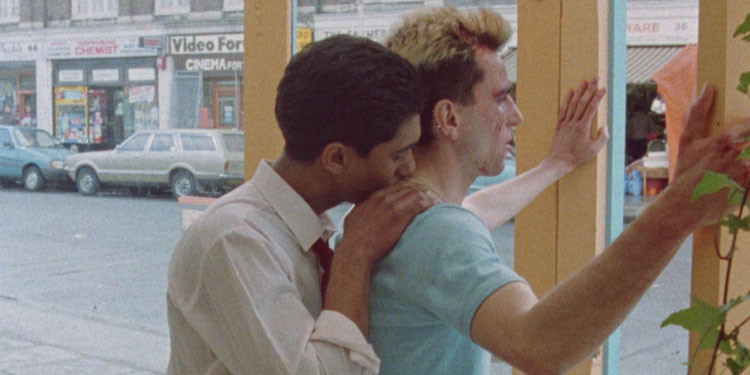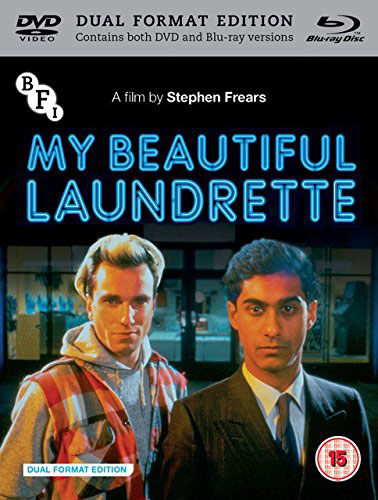
Director: Stephen Frears
Running Time: 97 mins
Certificate: 15
Release Date: August 21st 2017 (UK)

You could make the argument My Beautiful Laundrette is the most important movie of the past 50 years. In the 1980s the UK film industry was in a fairly difficult place. While British behind-the-scenes talent was much in demand by Hollywood to make some of their biggest movies – everything from Star Wars to Superman to Aliens was filmed in the UK – we were having less success with our own movies, at least on a mainstream level. Even those films that did find success were largely made with money from major American studios.
Then along came My Beautiful Laundrette, a film originally made for TV but which they decided was good enough to give a theatrical release to. Its surprise success got director Stephen Frears noticed around the world, who went on to make Dangerous Liaisons, High Fidelity, The Queen and Philomena. However, more importantly it was the first theatrical feature for the production company Working Title and the first major critical/commercial cinema success for Channel Four/Film 4.
Since Laundrette helped make their reputation and shift their focus, those two companies have perhaps defined mainstream British cinemas more in the last 30 years than any others. Between them they’ve produced everything from Four Weddings to The Full Monty, and from Trainspotting to Bridget Jones’ Diary.
And perhaps just as surprisingly and importantly for a film that found success around the world in the mid-1980s, it unapologetically centred the movie on gay/bisexual lead characters.
Omar (Gordon Warnecke) is a young, British Asian man, keen to make a success of himself, despite his socialist writer father being a wreck of a man following the suicide of Omar’s mother. He gets his uncle to allow him to take over a small, falling-to-bits laundrette, which Omar hopes will be the beginning of his ladder to riches.
Around the same time he also reunites with Johnny (Daniel Day Lewis in one of his first major screen roles), a childhood friend who Omar lost contact with when Johnny got in with a neo-fascist crowd. Now though, Johnny agrees to come and work in the laundrette – part assistant and part hired muscle. It doesn’t take long for their friendship and working relationship to develop into something romantic.
The film was the first produced screenplay by Hanif Kureishi, who successfully created a portrait of urban Britain in the mid-80s that feels authentic in a way few other films of the time managed to do. He brings in issues of economics (from socialism to Thatcherism), race relations, disaffected youth, sexuality, the changing face of British Asians (particularly in regard to the older generation’s Pakistani roots rubbing up against the western culture their children have grown up as part of), gender and plenty more. Perhaps most impressively it manages to bring all those elements in without feeling forced and while telling an interesting, perceptive and entertaining story.
Frears has said that he was most interested in the economic aspects of My Beautiful Laundrette, and that certainly shows with Omar trapped between his socialist father, rich uncle and a new wealthy associate whose help could come with major strings. Even with the young ‘fascist’ gang in the film, the film concedes that their problem is less genuine hatred of other races than a feeling that they’ve been betrayed socially and economically by their country, which is why ‘outsiders’ being successful seems wrong to them – and it’s easier to blame the ‘outsiders’ than look at the real causes.
Likewise, where Omar sees his future going and how he relates to his Britishness compared to the immigrant older members of his family all play into the movie. It’s not a film that comes to any firm conclusions about what was going on in Britain at the time, other than it feels something profound is happening as second-generation immigrants come of age amidst great social change across the nation.
Even in 2017 the way it handles Omar and Johnny’s sexuality manages to be surprising, purely because it’s so understated – it just is. There’s no big build-up to the first kiss, and no massive angst about it afterwards. The film doesn’t attempt to hide their intimacy, or to explain/minimise it for a straight audience.
It’s rare that a movie treats a character’s sexuality so matter of factly even today. It was pretty much unheard of the 80s.
Indeed, at the time some reviewers took issue with it, as they couldn’t see the ‘point’ of Johnny and Omar being gay/bisexual. The film itself is evolved enough to realise it might just be something they are, while also acknowledging it’s something that’s not without its issues in either 1980s British or British Asian culture.
The new Blu-ray & DVD release offers a good HD transfer of the movie, which thankfully hasn’t been overly cleaned or had the saturation dialled up to make it feel more modern. As you would expect from a BFI release, there’s a good selection of special features, some of which look directly back at My Beautiful Launderette, while others, such as the 1989 documentary ‘I’m British But…’, focus on the experience of being a young British Asian in the late-80s/early-90s.
For film fans there’s also the feature-length, ‘Typically British’, which follows Stephen Frears as he gives his own personal history of British cinema and the major influences on him, as well as chatting with luminaries such as Ealing legend Alexander Mackendrick, and his contemporaries Michael Apted and Alan Parker. It’s a worthwhile look at the history of cinema in the UK, and perhaps most interestingly what it is that make a film ‘British’.

Reviewer: Tim Isaac
Leave a Reply (if comment does not appear immediately, it may have been held for moderation)